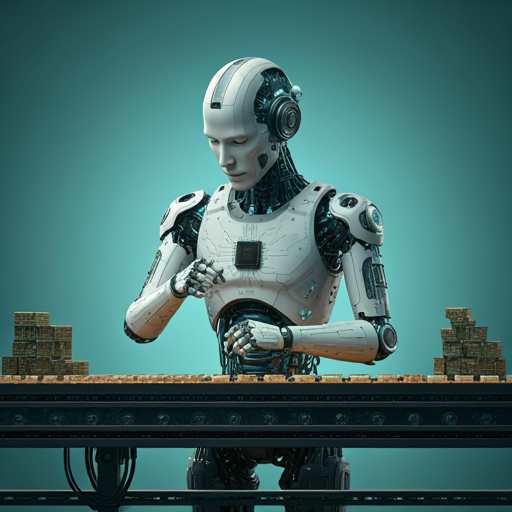I have seen already how Artificial intelligence (AI) is rapidly becoming a cornerstone of the United States economy, driving innovation, improving efficiency, and creating new industries. It is a new world.
 Here’s how AI is solidifying its role as a powerhouse in today’s economy:
Here’s how AI is solidifying its role as a powerhouse in today’s economy:
- Transforming Major Industries
- Healthcare: AI is revolutionizing healthcare with advanced diagnostics, personalized medicine, robotic surgery, and predictive analytics, reducing costs and improving patient outcomes.
- Finance: AI algorithms are powering fraud detection, algorithmic trading, risk assessment, and personalized financial services, increasing efficiency and accuracy in the financial sector.
- Manufacturing: Smart factories utilize AI-driven robotics, predictive maintenance, and supply chain optimization to boost productivity and reduce downtime.
- Retail and E-commerce: AI is used for inventory management, personalized shopping experiences, and demand forecasting, transforming consumer interactions and logistics.
- Boosting Productivity
AI automates repetitive and time-consuming tasks, allowing businesses to focus on innovation and strategy. Tools like natural language processing, computer vision, and machine learning enhance human capabilities, leading to significant productivity gains across sectors.
- Driving Innovation
AI accelerates research and development by processing massive datasets quickly, enabling breakthroughs in fields like renewable energy, biotechnology, and materials science. Startups and established companies alike leverage AI to develop disruptive products and services.
- Enhancing Business Decision-Making
Data-driven insights generated by AI help companies make more informed decisions. AI tools analyze trends, predict market behavior, and identify new opportunities, giving businesses a competitive edge.
- Job Creation and Transformation
While AI automates certain roles, it is also creating demand for new jobs in AI development, data science, machine learning engineering, and AI ethics. Training and reskilling initiatives are helping workers adapt to these emerging opportunities.
- National Security and Defense
AI is a priority in national security, with applications in cybersecurity, drone technology, intelligence analysis, and autonomous systems. These investments also spill over into commercial innovation.
- Startups and Venture Capital
The U.S. is home to a vibrant AI startup ecosystem, with venture capitalists investing heavily in AI-driven companies. This entrepreneurial activity fosters economic growth and positions the U.S. as a global leader in AI.
- Infrastructure and Smart Cities
AI is being integrated into infrastructure projects, optimizing traffic flow, energy consumption, and urban planning, leading to smarter, more efficient cities that support economic growth.
- Export Leadership
The U.S. leads in exporting AI technologies and expertise, strengthening its position in the global economy. American companies are at the forefront of developing AI software, hardware, and services adopted worldwide.
- Increased Productivity and Efficiency:
Automation of Routine Tasks: AI-powered automation tools are streamlining repetitive tasks, freeing up human workers to focus on more complex and creative endeavors. This leads to increased productivity and cost savings for businesses.
- Enhanced Decision-Making
AI algorithms can analyze vast amounts of data to identify patterns and trends that humans might miss. This enables businesses to make more informed and data-driven decisions, leading to improved outcomes.
- Innovation and New Industries:
Accelerated Research and Development: AI is accelerating scientific research by analyzing data, identifying patterns, and generating new hypotheses. This is leading to breakthroughs in various fields, including medicine, materials science, and energy.
- Emergence of New Business Models
AI is enabling the creation of entirely new industries and business models. For example, AI-powered personalized medicine and autonomous vehicles are reshaping healthcare and transportation.
- Improved Customer Experiences:
Personalized Services: AI-powered tools can analyze customer data to provide highly personalized products and services, enhancing customer satisfaction and loyalty.
- Enhanced Customer Support
AI-powered chatbots and virtual assistants can provide efficient and effective customer support, reducing response times and improving customer experiences.
- Economic Growth and Job Creation:
Increased GDP: The widespread adoption of AI is expected to contribute significantly to economic growth by boosting productivity and innovation.
Job Creation: While some jobs may be automated, AI is also creating new jobs in fields such as data science, AI engineering, and AI ethics.
Challenges and Considerations:
While AI presents immense opportunities, challenges such as ethical concerns, workforce displacement, and data privacy must be addressed. Policies promoting innovation while ensuring equitable benefits can help maximize AI’s positive impact on the economy.
Job Displacement: Automation of routine tasks could lead to job losses in certain sectors.
Ethical Concerns: The use of AI raises ethical questions regarding bias, privacy, and accountability.
Infrastructure and Talent: The widespread adoption of AI requires significant investments in infrastructure and the development of AI talent.
In summary, AI is becoming a powerhouse in the U.S. economy by reshaping industries, creating new markets, and enhancing productivity. Its ability to drive innovation and adapt to diverse applications ensures it will remain a key driver of economic growth in the years to come.
